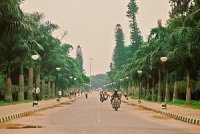Bangalore (now officially changed to Bengaluru, but still popularly known by its old name) is one of India’s main metropolitan cities, among its most modern, developed, and urban areas. Like most of India, Bangalore is a place of great contradictions – dazzling affluence and stark poverty, modern conveniences next to infrastructure that is often outdated and outstripped by demand, and a welcoming, cosmopolitan place that sometimes is tainted by parochialism and prejudice. Bangalore has a large community of expats from all over the world, and is a relatively easy city to settle into, but it’s always helpful to know what to expect, and to consider whether and how you want to make the move.Climate
In terms of its climate, Bangalore is among the most pleasant cities in India to live in. Summer temperatures rarely go much over 30 degrees centigrade, and winter temperatures rarely drop below 15. You should of course expect the usual tropical features like rain and humidity, but again, these are much milder than they are in most other parts of India. Bangalore doesn’t have the intense, lengthy monsoon that much of India has – instead, you can expect occasional light rainfall through the year, with most of it concentrated between August and October. Bangalore doesn’t suffer from the regular flooding that Bombay and Delhi do, although the summer thunderstorms can cause the occasional flood or power outage.
Health and healthcare
With the great weather, there are certain health considerations that you don’t need to worry about in Bangalore. However, expats who aren’t used to these temperatures and the humidity tend to come down with colds and coughs in the first few months. A more major concern is mosquito-borne illnesses like malaria and dengue fever, as well as gastrointestinal diseases. However, these can easily be avoided with the right precautions: mosquito repellents, mosquito nets, keeping your windows closed at certain times of the day (and especially at certain times of the year), and being particular about what you eat and drink when you’re not at home.
Your standard vaccinations are of course necessary in Bangalore, and in addition, depending on your age and lifestyle, you should consider some additional vaccines, such as typhoid and rabies.
Healthcare facilities are excellent in Bangalore – the city has world-class doctors and hospitals for those who can afford them, and for most expats, affordability of healthcare is not a problem. Nonetheless, you should find out about good health insurance for you and your family. Emergency services in Bangalore are unfortunately not ideal, and this is one area where you will have to play an active role. Stock first-aid supplies in your vehicle and at home, be aware of where the nearest reliable doctors and hospitals are, and find out about reliable ambulance services.
Transport and infrastructure
Bangalore’s public transport has always been cheap but inadequate. Connectivity and user-friendliness of the public bus services are far from ideal, leading most Bangalore citizens to prefer private vehicles or autorickshaws – both of which, again, are not straightforward. The autos in Bangalore are notorious for either refusing fares or charging arbitrary and exorbitant rates, and travelling in your own vehicle is also often quite unpleasant due to the poor roads and the terrible traffic jams.
Fortunately, a metro train service was recently implemented, and although it is still in the initial stages of development and currently has limited connectivity, it has helped.
In terms of accommodation, Bangalore has options for every budget, and expats can easily find reasonably priced accommodation that has all the necessary facilities. Shopping is also easy – there are numerous local markets, neighborhood vendors and shops, as well as international shopping malls selling every kind of product from most international brands.
Safety
Bangalore is a fairly safe city to live in, including for women, expats, and the elderly. As long as you take some basic precautions and remain aware of your surroundings and the people you are dealing with, you should be safe. This is of course not to say that there is no crime, but it is not much more serious and not much more frequent than any other big city anywhere in the world. There is the occasional terror alert, but again, most international big cities today have these, and the probability of an event actually occurring is extremely low. Religious and inter-community tensions are also quite low in Bangalore, and although there has been the occasional flare-up, the city is mostly very peaceful.

